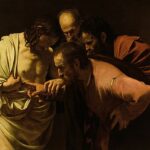Richard B. Gaffin Jr., emeritus professor of biblical and systematic theology at Westminster Theological Seminary, recently delivered a Boice Lecture at the Tenth Presbyterian Church of Philadelphia on “Inerrancy, Adam, and the Gospel: The Bible on Human Origins: Some Observations.”
Dr. Gaffin starts talking around the 4:30 mark. At the 1:04:30 mark he begins taking questions:
Here’s an outline of what he covers:
1. The Issue
2. Objections: Scientific and Exegetical
3. Scripture and Science
Hebrews 1:1 Long ago, at many times and in many ways, God spoke to our fathers by the prophets, 2 but in these last days he has spoken to us by his Son, …
4. Adam and Christ
Romans 5:12-19 12 Therefore, just as sin came into the world through one man, and death through sin, and so death spread to all men because all sinned, 14 … Adam, who was the type of the one who was to come. 15 But the free gift is not like the trespass. For if many died through one man’s trespass, much more have the grace of God and the free gift by the grace of that one man Jesus Christ abounded for many. 16 And the free gift is not like the result of that one man’s sin. For the judgment following one trespass brought condemnation, but the free gift following many trespasses brought justification. 17 If, because of one man’s trespass, death reigned through that one man, much more will those who receive the abundance of grace and the free gift of righteousness reign in life through the one man Jesus Christ. 18 Therefore, as one trespass led to condemnation for all men, so one act of righteousness leads to justification and life for all men. 19 For as by the one man’s disobedience the many were made sinners, so by the one man’s obedience the many will be made righteous.
1 Corinthians 15:21-22 For as by a man came death, by a man has come also the resurrection of the dead. 22 For as in Adam all die, so also in Christ shall all be made alive.
1 Corinthians 15:44-49 It is sown a natural body; it is raised a spiritual body. If there is a natural body, there is also a spiritual body. 45 Thus it is written, “The firstman Adam became a living being”; the lastAdam became the life-giving Spirit. 46 But it is not the spiritual that is first but the natural, and then the spiritual. 47 The firstman was of the earth, earthly; the secondman is from heaven. 48 As was the one who is earthly, so also are those who are earthly, and as is the one who is heavenly, so also are those who are heavenly. 49 And just as we have borne the image of the one who is earthly, we shall also bear the image of the one who is heavenly.
Acts 17:26 And he made from one man every nation of mankind to live on all the face of the earth, … 30 The times of ignorance God overlooked, but now he commands all people everywhere to repent, …
5. Inadequate Interpretations
6. Implications and Conclusion
 For those wanting to read more on this topic, this forthcoming book edited by Hans Madueme and Michael Reeves looks excellent: Adam, the Fall, and Original Sin: Theological, Biblical, and Scientific Perspectives (Baker, coming in August 2014).
For those wanting to read more on this topic, this forthcoming book edited by Hans Madueme and Michael Reeves looks excellent: Adam, the Fall, and Original Sin: Theological, Biblical, and Scientific Perspectives (Baker, coming in August 2014).
Here is the publisher’s description:
The Christian doctrines of original sin and the historical fall of Adam have been in retreat since the rise of modernity. Here leading scholars present a theological, biblical, and scientific case for the necessity of belief in original sin and the historicity of Adam and Eve in response to contemporary challenges. Representing various Christian traditions, the contributors shed light on recent debates as they present the traditional doctrine of original sin as orthodox, evangelical, and the most theologically mature and cogent synthesis of the biblical witness. This fresh look at a heated topic in evangelical circles will appeal to professors, students, and readers interested in the creation-evolution debate.
Contents
Introduction Hans Madueme and Michael Reeves
Part 1: Adam in the Bible and Science
1. Adam and Eve in the Old Testament C. John Collins
2. Adam in the New Testament Robert Yarbrough
3. Adam and Modern Science William Stone
Part 2: Original Sin in History
4. Original Sin in Patristic Theology Peter Sanlon
5. The Lutheran Doctrine of Original Sin Robert Kolb
6. Original Sin in Reformed Theology Donald Macleod
7. “But a Heathen Still”: The Doctrine of Original Sin in Wesleyan Theology Tom McCall
8. Original Sin in Modern Theology Carl Trueman
Part 3: Original Sin in Theology
9. Original Sin in Biblical Theology James M. Hamilton
10. Threads in a Seamless Garment: Original Sin in Systematic Theology Michael Reeves and Hans Madueme
11. “The Most Vulnerable Part of the Whole Christian Account”: Original Sin and Modern Science Hans Madueme
12. Original Sin in Pastoral Theology Dan Doriani
Part 4: Adam and the Fall in Dispute
13. Original Sin and Original Death: Romans 5:12-19 Tom Schreiner
14. The Fall and Genesis 3 Noel Weeks
15. Adam, History, and Theodicy William Edgar
Postscript Michael Reeves and Hans Madueme
“This is a long-overdue book on a crucial flash point in evangelical faith and theology: the sin that dare not speak its name (‘original’). The structure is clearly laid out, making it an appealing choice in various kinds of Bible college and seminary classes. Indeed, I suspect it will become a popular textbook in a number of evangelical institutions.”
—Kevin J. Vanhoozer, research professor of systematic theology, Trinity Evangelical Divinity School
Gaffin, Beale, Frame, Reeves, and others have also commended the book, Adam in the New Testament: Mere Teaching Model or First Historical Man? 2nd ed (P&R 2012), written by J.P. Versteeg with a foreword from Gaffin.
“This is the basic thread of [Versteeg’s] argumentation: if it is not true that all human beings descend from Adam as the first human being, then the entire history of redemption documented in Scripture unravels. The result is no redemptive history in any credible or coherent sense and so the loss of redemptive history in any meaningful sense. Versteeg’s work is as timely today as when it was first written. The publisher is to be commended for making its translation available again.”
—Richard B. Gaffin Jr., Emeritus Professor of Biblical and Systematic Theology, Westminster Theological Seminary
“This book is the best that I know of in demonstrating exegetically that the parallels drawn by Paul between Adam and Christ (as the Last Adam) necessitate viewing not only Christ as a historical figure but also the first Adam as an actual historical figure. The argument is made persuasively and convincingly that, if one concludes that the first Adam was not historical, then one should be driven to the conclusion that Jesus as the Last Adam was not historical—the latter conclusion even very few unbelieving scholars would be willing to hold. Other references to Adam outside of Paul in the New Testament are also discussed, and the same conclusion is convincingly reached about the historicity of the first Adam. One might not agree with everything said about other issues outside of the Adam-Christ topic, but the conclusions reached about Adam and Christ are sane, sober, and reliable.”
—Gregory K. Beale, Professor of New Testament and Biblical Theology, Westminster Theiological Seminary
“Denying the historicity of Adam or his significance for our own original sin is not just an issue of science versus the Old Testament. For the New Testament, as in Romans 5, deals with Adam as well, in an important theological context. For the apostle Paul, our sin begins in Adam, as our redemption begins in Christ. Theologians cannot escape this teaching merely by saying that Adam is a myth or legend; they must also account for his role in Paul’s doctrine of salvation. So a number of theologians, such as H. M. Kuitert, have postulated that Adam is a ‘teaching model’ in the New Testament. Versteeg’s remarkably cogent and concise book tells us why this view is impossible. It was a great help to us when it was first published in 1979. But it is even more helpful now. Recently, some have claimed that analysis of the human genome forbids us to believe that the human race began with a single couple. In the face of such arguments, it is important to remind ourselves why the church has maintained that Adam is the first man and the source of human sin. I do hope this book gets a wide readership.”
—John M. Frame, Professor of Systematic Theology and Philosophy, Reformed Theological Seminary, Orlando
“What an important book this is for today! Sane, clear and thorough, it offers a stout answer for those questioning the historicity of Adam, and lucidly shows why it remains non-negotiable. All thinking Christians need to read this.”
—Michael Reeves, Head of Theology, University and Colleges Christian Fellowsh


















